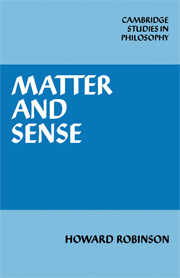Book contents
- Frontmatter
- Contents
- Acknowledgments
- 1 The materialist's problem and some non-reductive solutions
- 2 Supervenience and reduction
- 3 Behaviourism and stimulus materialism
- 4 The causal theory of mind
- 5 The disappearance theory
- 6 Reductive theories of perception
- 7 Matter: turning the tables
- Conclusion
- References
- Index
1 - The materialist's problem and some non-reductive solutions
Published online by Cambridge University Press: 07 May 2010
- Frontmatter
- Contents
- Acknowledgments
- 1 The materialist's problem and some non-reductive solutions
- 2 Supervenience and reduction
- 3 Behaviourism and stimulus materialism
- 4 The causal theory of mind
- 5 The disappearance theory
- 6 Reductive theories of perception
- 7 Matter: turning the tables
- Conclusion
- References
- Index
Summary
INTRODUCTION
William James divided philosophers into two psychological types, the tender-minded and the tough-minded. One of the characteristics of the tough-minded is a disposition to believe in philosophical materialism, whilst the tender-minded prefer dualism or idealism. The epithets ‘tender-minded’ and ‘tough-minded’ are not meant as evaluations of the arguments used to defend the theories each type is inclined to adopt; rather they describe the temperaments which are prone to accept and defend those theories: they are a psychological not a rational evaluation. Despite their association with the toughminded temperament, materialist theories have tended to get the worst of the argument a bout the nature of the mind, if we judge by influence on the history of philosophy. Plato and Aristotle, for example, have had a greater appeal for philosophers through the ages than have the epicureans or the atomists: Descartes's influence is much greater than Hobbes's. This has been so despite the influence on modern philosophy of the materialistically inclined physical sciences. James also classified the approach and doctrines normally labelled ‘empiricist’ as tough-minded, yet empiricists have tended not to be materialists. The modern philosopher most representative of traditional empiricism, Sir Alfred Ayer, can both declare that his only object of faith is science and express a reluctant pessimism about the possibility of a coherent materialist theory of the human mind.1 One may be tempted to cynicism and suspect that otherwise hardnosed philosophers become tender-minded when dealing with their own souls.
- Type
- Chapter
- Information
- Matter and SenseA Critique of Contemporary Materialism, pp. 1 - 19Publisher: Cambridge University PressPrint publication year: 1982



